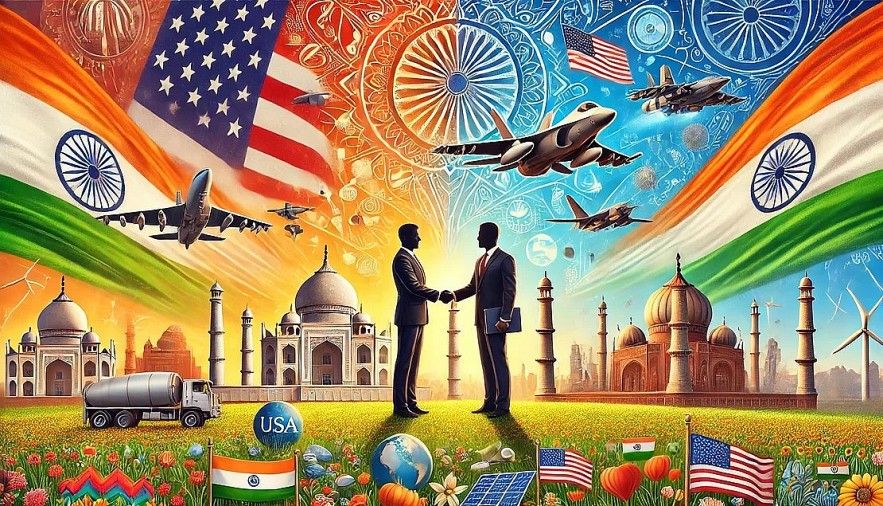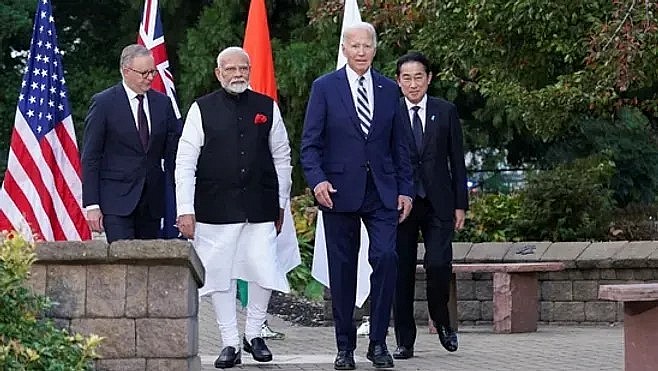Forging the future: How Prime Minister Modi's U.S. visit strengthens India-America ties
Under the leadership of Prime Minister Narendra Modi and successive U.S. presidents, this bilateral partnership has seen significant growth in various fields, including defense, technology, trade, and diplomacy. Prime Minister Modi’s ongoing visit to the United States is expected to not only consolidate the existing bond between the two nations but also add a fresh impetus to areas of cooperation, enhancing the global strategic and economic architecture. This essay explores how Modi's visit can deepen the India-U.S. relationship, reinforce existing ties, and shape a future of shared prosperity and security.
 |
Strengthening Strategic and Defense Ties
India and the United States are natural strategic partners with a shared interest in ensuring stability in the Indo-Pacific region. The rise of China’s influence and the need to maintain a free, open, and rules-based order have driven the two nations closer. PM Modi's visit is expected to lead to further discussions and agreements on defense cooperation, enhancing existing frameworks like the Communications Compatibility and Security Agreement (COMCASA), Logistics Exchange Memorandum of Agreement (LEMOA), and Basic Exchange and Cooperation Agreement (BECA).
A key focus of Modi's ongoing visit is the consolidation of the Quad (Quadrilateral Security Dialogue), comprising India, the U.S., Japan, and Australia. The Quad plays a pivotal role in counterbalancing China's growing influence in the Indo-Pacific and ensuring maritime security. As the U.S. continues its pivot to Asia, India's strategic importance in the region becomes more pronounced. Modi's visit provides an opportunity to strengthen defense agreements, expand joint military exercises like the Malabar Naval Exercise, and advance the partnership through the co-development of critical technologies, such as drones, defense hardware, and artificial intelligence.
Moreover, the U.S.'s decision to offer India advanced defense technology, including jet engines and armed drones, marks a new era of defense cooperation. This transfer of technology not only reflects the deepening trust between the two nations but also underlines India's growing role as a defense power in the region. Modi's visit can help solidify such deals, laying the groundwork for future collaboration in cutting-edge defense technologies, further enhancing India's self-reliance and the U.S.'s strategic interests.
 |
Bolstering Economic and Trade Ties
India and the United States are each other's key trading partners. In recent years, bilateral trade has grown exponentially, with U.S. exports to India exceeding $60 billion and Indian exports to the U.S. surpassing $70 billion annually. Modi's visit provides a timely opportunity to push for further trade liberalization, potentially addressing tariff-related concerns and fostering an environment conducive to economic collaboration.
An important area of economic cooperation is the technology and digital economy sector. India, as a global leader in IT services, and the U.S., home to the world’s largest tech companies, are natural partners in this domain. With India’s ambitious Digital India initiative and the U.S.'s advanced technological capabilities, the two countries have the potential to lead the world in digital transformation. Modi's discussions with U.S. leaders and business heads will likely focus on expanding collaboration in sectors like artificial intelligence, quantum computing, cybersecurity, and space technology.
Additionally, both countries could work on improving supply chain resilience, a topic that has gained urgency due to the disruptions caused by the COVID-19 pandemic and geopolitical tensions. India's "Make in India" and "Atmanirbhar Bharat" (self-reliant India) initiatives align well with U.S. efforts to diversify its supply chains and reduce dependence on China. By forging stronger trade ties and facilitating greater U.S. investment in India's manufacturing sector, the visit could serve as a catalyst for further economic growth.
Climate Change and Clean Energy Partnership
One of the most pressing global challenges today is climate change, and India and the United States are crucial players in the global fight against it. India has been actively working toward reducing its carbon emissions, as seen in its commitment to achieving net-zero emissions by 2070. Modi’s ongoing visit can further enhance cooperation in clean energy technologies, green financing, and renewable energy projects, building on the progress made in the U.S.-India Climate and Clean Energy Agenda 2030 Partnership.
The U.S., under President Biden, has prioritized climate action and has the technological expertise to support India's transition to clean energy. By working together on technologies like solar power, hydrogen energy, and carbon capture, India and the U.S. can not only contribute to global climate goals but also create new economic opportunities. Modi's visit offers a platform for the two countries to deepen their partnership in clean energy, addressing critical issues like energy security, sustainable development, and the reduction of greenhouse gas emissions.
Strengthening People-to-People Ties
One of the cornerstones of the India-U.S. relationship is the strong people-to-people connection. With over 4 million Indian Americans living in the U.S. and countless students, professionals, and entrepreneurs contributing to both economies, the human capital element of the bilateral relationship is significant. Prime Minister Modi's visit highlights the importance of this cultural and economic bridge.
Indian professionals, especially in sectors like technology, medicine, and academia, have made significant contributions to the U.S. economy. Meanwhile, the U.S. continues to be a preferred destination for Indian students seeking higher education. Modi's discussions with American leaders could pave the way for more relaxed visa regimes, especially for highly skilled workers and students, ensuring a steady flow of talent between the two nations. This can help address U.S. labor shortages in critical sectors and offer new opportunities for Indian professionals.
Additionally, Modi’s meetings and grand event with the Indian diaspora will reinforce the role of Indian Americans in strengthening bilateral ties. The diaspora serves as an important cultural and economic link, and Modi’s outreach will likely inspire greater collaboration and engagement from the Indian community in the U.S.
Geopolitical Implications
Beyond bilateral gains, Modi’s visit to the U.S. has broader geopolitical implications. As both nations face growing challenges from an assertive China, strengthening the India-U.S. partnership becomes strategically crucial. Modi's discussions with U.S. leaders on global issues such as terrorism, cyber threats, and peacekeeping can add momentum to joint efforts in promoting global stability and combating common threats.
Furthermore, India’s growing stature on the world stage, as evidenced by its G20 presidency and active involvement in multilateral forums, aligns with U.S. interests in fostering global peace and stability. Modi’s visit could lead to closer coordination on global issues like counterterrorism, human rights, and regional stability, adding depth to the partnership.
Prime Minister Modi's ongoing visit to the U.S. represents a pivotal moment in the evolution of India-U.S. relations. The visit is not just about strengthening defense, trade, or economic ties but also about shaping a future of strategic collaboration in areas like clean energy, digital technologies, and global security. With the two nations increasingly recognizing the value of their partnership in shaping a rules-based global order, Modi's visit will undoubtedly add further impetus to the already excellent India-U.S. relationship, fostering a future of shared growth, security, and prosperity.
Recommended
 World
World
Pakistan NCRC report explores emerging child rights issues
 World
World
"India has right to defend herself against terror," says German Foreign Minister, endorses Op Sindoor
 World
World
‘We stand with India’: Japan, UAE back New Delhi over its global outreach against terror
 World
World
'Action Was Entirely Justifiable': Former US NSA John Bolton Backs India's Right After Pahalgam Attack
Popular article
 World
World
US, China Conclude Trade Talks with Positive Outcome
 World
World
Nifty, Sensex jumped more than 2% in opening as India-Pakistan tensions ease
 World
World
Easing of US-China Tariffs: Markets React Positively, Experts Remain Cautious
 World
World



